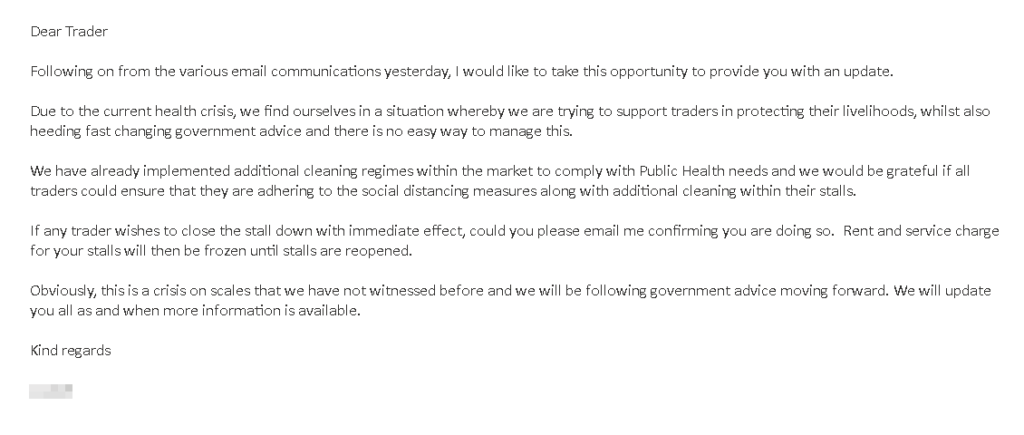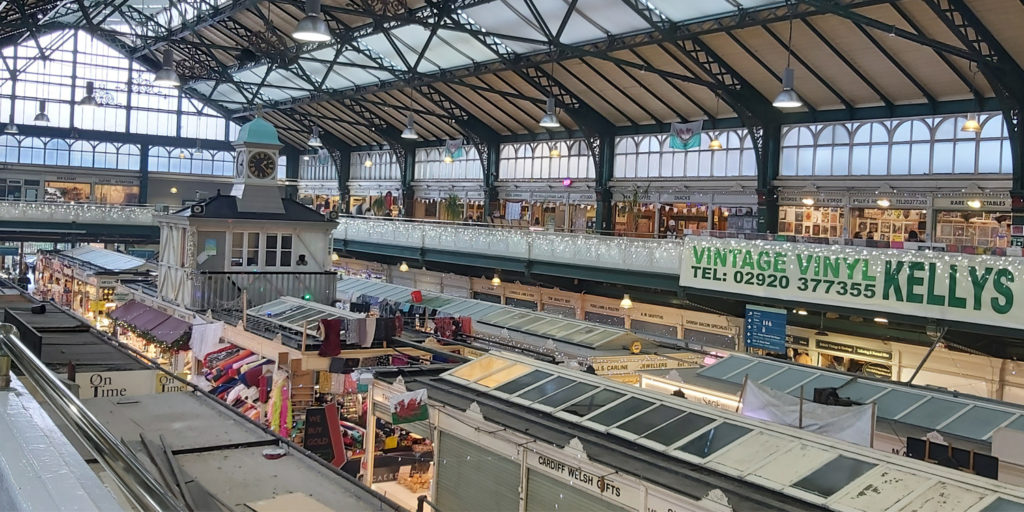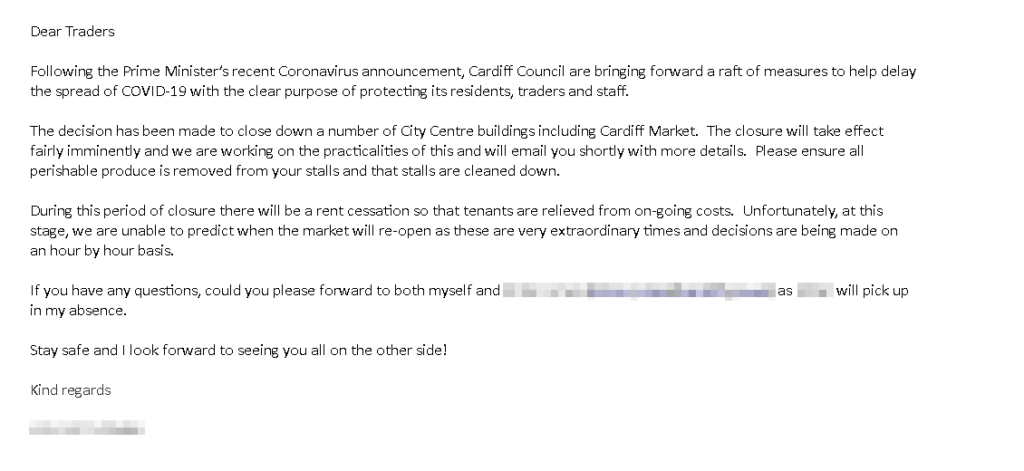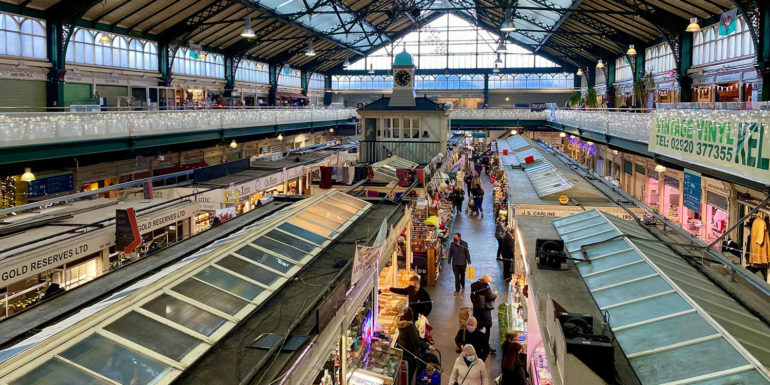Stall holders face backdated bills of up to £7,000 each for the period they were closed due to Coronavirus restrictions
TRADERS at Cardiff Central Market face backdated rent demands of up to £7,000 each amid claims the council reversed a promised rent freeze during the Covid-19 lockdown.
The council has issued bills for rent payments for April, May and June, despite stallholders understanding from multiple previous statements that traders would not have to pay.
An email sent to stall holders on March 18 by Market Manager Louise Thomas stated: “During this period of closure there will be a rent cessation so that tenants are relieved from on-going costs.”
A follow-up email on March 19 stated: “If any trader wishes to close the stall down with immediate effect, could you please email me confirming you are doing so. Rent and service charge for your stalls will then be frozen until stalls are reopened.”
Stallholders closed under the impression that they would not have to cover rent or service charges. However, the council has since issued a demand for any relevant traders to pay the backdated rent bills.
Cardiff Council says it had always planned to collect the backdated rent.

A council email to the market traders on July 9 states: “You will shortly receive invoicing for the rent and service charge backdated to the start of April.”
Stall holder Kelly Bridgeman, who runs The Secret Garden florist, said: “It will be a few thousand.
“We weren’t making any money, so to have to fork out for something that we weren’t receiving… I would have thought that the council would have some leniency towards stall holders.
“If they want to keep the stall holders going forward, then taking out that chunk of money is really going to affect some stall holders and some probably won’t be able to survive if they do have to pay it back. Fingers crossed it doesn’t happen.”
One stall holder, who wished to remain anonymous to prevent any issues with their rental agreement, said: “We were told by market officials that we wouldn’t have to pay rent or service charges.
“Then the council reneged on that and said they never actually said that.”
Cardiff Council disputes this claim and says that the rent payments were deferred rather than stopped entirely.
“I note that traders claim that they were told that they would not have to pay these charges,” said Cabinet Member for Investment and Development Councillor Russell Goodway in response to the Tenants Association.

“I have checked, and they were told that the rent would be deferred not written off. I think some may have interpreted deferral as meaning that they would not have to pay at all.”
A third trader, who also wished to remain anonymous to avoid tensions in the market, said: “This obviously was not communicated to anyone.”
This isn’t the only time Cardiff Central Market traders have faced uncertainty during the pandemic.
During the first national lockdown metal fences were erected around closed stalls and visits were ‘by arrangement only.’ Only four stalls remained open with strict social distancing.
The market reopened fully on June 29, a week after other non-essential shops were allowed to reopen.
“The majority of people aren’t happy,” said the third business owner.
“They didn’t keep us up to date and they’ve not informed any of us what’s going on.”
The Cardiff Central Market Tenants Association has since approached local councillors to request that the backdated rent be written off.
One email from July – and seen by The Cardiffian – states: “Without some form of financial assistance up to a third of the small family run businesses may well cease to trade. Those that remain are likely to need to make significant job cuts to survive.”
Coun Goodway has stressed that Cardiff Council is exploring funding options from the Welsh Government to cover the backdated rent bills.
“The Council has recently identified Welsh Government funding that could potentially cover the rent and/or service charge for this period for the Market,” he said.

“I have requested my officials to prepare and submit a claim. Should this claim be successful, the rent and service charge for the lockdown period would be covered (apart from the 50% rent agreed with those four tenants that remained open).”
Cardiff Central Market stallholders have not yet been told whether the Welsh Government funding will apply to them.
In the meantime, Cardiff Council has paused invoicing for the outstanding rent demands.
“I’m not aware of a dispute,” said Coun Goodway when asked about the issue by The Cardiffian.
He says that the council lived up to its original statement about the cessation of rent: “That was the case – we didn’t collect the rent.”
However, Coun Goodway says that the plan was always to recover those outstanding payments.
“That was a misunderstanding rather than reneging on anything. The council didn’t collect rent during that period. It wasn’t just the market – it was the entire council’s estate,” he said.
“We’ve got lots of properties across the city that we rent to tenants and we didn’t collect rent from any tenant during that period. But we did make it clear that we would recover the rent once they were back trading and that’s what we did with every one of our tenants.”
Most stallholders that have resumed trading have seen a much lower footfall of customers.
In the emails from July traders plead with councillors: “Since reopening, having made financial investment to meet Covid 19 regulations, the footfall has been pitiful. Most of the businesses that have opened are operating at a severe financial loss.
“The tenants employ close to 250 employees and unless we get some financial support could well lead to the market following the general decline that is happening on all of our major city centre shopping streets.”
Other South Wales councils have provided more support to market traders.
Stall holders at Swansea Market were not charged rent at all during the national lockdown. Since then, Swansea Market stalls have seen significant rent discounts.
Stall holders paid just 35% rent until August 23 when this rose to 70% rent. It was only on November 16 when Swansea Market traders began paying their usual rent and service charges.



